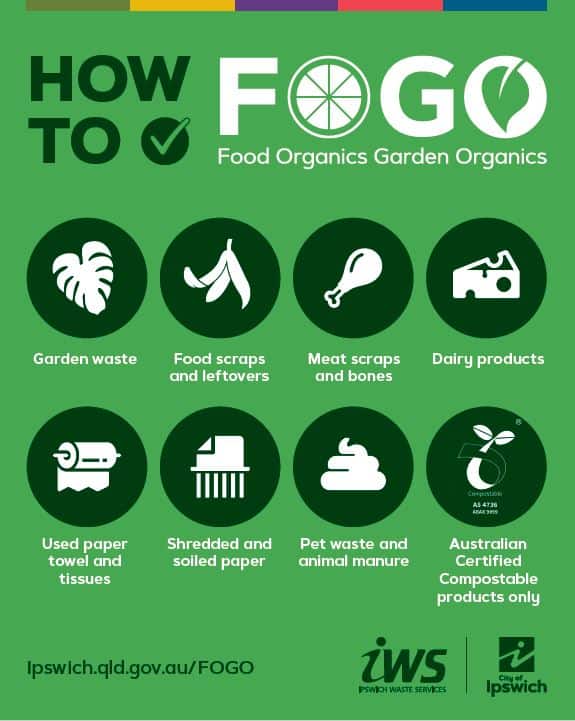Bellbird Park residents recently wrapped up their contributions to a year-long Council evaluation of local household food and garden waste collection, with some promising – if mixed – results.
A component of Ipswich City Council’s ongoing Resource Recovery Strategy and Implementation Plan (2021-2031), over a thousand households across the two suburbs of Bellbird Park and Raceview, in southern Ipswich, participated in the trial of fortnightly kerbside collections of “FOGO” bins – that is, Food Organics and Garden Organics waste.
Running from September 2021 through to August last year, the trial was a first for Queensland, tackling the big issue of unnecessary food waste.
Around three-fifths of all general household waste (placed in the red-lid bins) could otherwise be recovered through the FOGO (lime green lid) and recycling (yellow lid) bins, according to the Council.
Formerly called “green waste”, FOGO includes any and all food scraps and leftovers, soiled paper towels and tissues, pet waste, shredded paper, and any products marked with the ‘Australian Certified Compostable’ logo.
This type of waste can instead be sent to a composting facility to help reduce the amount sent to landfill, which produces foul odours in the form of methane resulting from decomposition – as has been reported just a few kilometres away from Bellbird Park and Augustine Heights.
Growth, Infrastructure and Waste Committee Chair and Ipswich Mayor Teresa Harding was grateful for the public’s participation, measuring how readily people would adapt.
“I want to thank the residents of Raceview and Bellbird Park for allowing Council to collect an enormous amount of valuable data that can now be used to support service and investment decisions going forward,” Mayor Harding said.
“There were 33,771 FOGO collections, which resulted in 82 tonnes of organic material being diverted from landfill.”
The trial sought to optimise methods of communicating how to avoid waste contamination, Cr Harding explained, including a range of surveys, home visits, and information sessions.
“The overall contamination rate was 30 per cent, which is quite high making it expensive and challenging to effectively process and recover this material from landfill, so there is still work to do in our community to better educate ourselves around separating and sorting our waste correctly.
Division 2 Councillor Nicole Jonic said “It was great to see residents become better educated and more aware of how much waste they are producing, and how it could end up producing the best outcome away from landfill.”
One of the key pillars of the Resource Recovery Strategy is to “expand the core collection service to include a food organics garden organics bin for all eligible Ipswich residents by 2023-2024,” according to documents on the Council website.

Detailed results of the trial can be found at the Council’s interactive website www.shapeyouripswich.com.au/fogotrial.
To register for a FOGO bin, contact the Council via the MyIpswich.com website or call 3810 6666. It costs $20 per quarter, added to your rates bill (for a minimum of one year).
